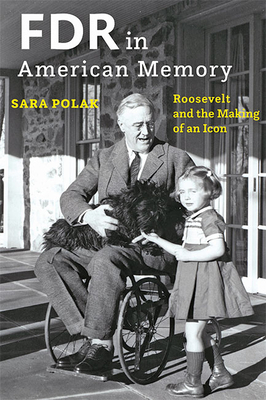FDR in American Memory: Roosevelt and the Making of an Icon

FDR in American Memory: Roosevelt and the Making of an Icon
How was FDR's image constructed--by himself and others--as such a powerful icon in American memory?
In polls of historians and political scientists, Franklin Delano Roosevelt consistently ranks among the top three American presidents. Roosevelt enjoyed an enormous political and cultural reach, one that stretched past his presidency and across the world. A grand narrative of Roosevelt's crucial role in the twentieth century persists: the notion that American ideology, embodied by FDR, overcame the Depression and won World War II, while fascism, communism, and imperialism--and their ignoble figureheads--fought one another to death in Europe. This grand narrative is flawed and problematic, legitimizing the United States's cultural, diplomatic, and military role in the world order, but it has meant that FDR continues to loom large in American culture.
In FDR in American Memory, Sara Polak analyzes Roosevelt's construction as a cultural icon in American memory from two perspectives. First, she examines him as a historical leader, one who carefully and intentionally built his public image. Focusing on FDR's use of media and his negotiation of the world as a disabled person, she shows how he consistently aligned himself with modernity and future-proof narratives and modes of rhetoric. Second, Polak looks at portrayals and negotiations of the FDR icon in cultural memory from the vantage point of the early twenty-first century. Drawing on recent and well-known cultural artifacts--including novels, movies, documentaries, popular biographies, museums, and memorials--she demonstrates how FDR positioned himself as a rhetorically modern and powerful but ideologically almost empty container. That deliberate positioning, Polak writes, continues to allow almost any narrative to adopt him as a relevant historical example even now.
As a study of presidential image-fashioning, FDR in American Memory will be of immediate relevance to present-day readers.
PRP: 427.50 Lei
Acesta este Prețul Recomandat de Producător. Prețul de vânzare al produsului este afișat mai jos.
342.00Lei
342.00Lei
427.50 LeiLivrare in 2-4 saptamani
Descrierea produsului
How was FDR's image constructed--by himself and others--as such a powerful icon in American memory?
In polls of historians and political scientists, Franklin Delano Roosevelt consistently ranks among the top three American presidents. Roosevelt enjoyed an enormous political and cultural reach, one that stretched past his presidency and across the world. A grand narrative of Roosevelt's crucial role in the twentieth century persists: the notion that American ideology, embodied by FDR, overcame the Depression and won World War II, while fascism, communism, and imperialism--and their ignoble figureheads--fought one another to death in Europe. This grand narrative is flawed and problematic, legitimizing the United States's cultural, diplomatic, and military role in the world order, but it has meant that FDR continues to loom large in American culture.
In FDR in American Memory, Sara Polak analyzes Roosevelt's construction as a cultural icon in American memory from two perspectives. First, she examines him as a historical leader, one who carefully and intentionally built his public image. Focusing on FDR's use of media and his negotiation of the world as a disabled person, she shows how he consistently aligned himself with modernity and future-proof narratives and modes of rhetoric. Second, Polak looks at portrayals and negotiations of the FDR icon in cultural memory from the vantage point of the early twenty-first century. Drawing on recent and well-known cultural artifacts--including novels, movies, documentaries, popular biographies, museums, and memorials--she demonstrates how FDR positioned himself as a rhetorically modern and powerful but ideologically almost empty container. That deliberate positioning, Polak writes, continues to allow almost any narrative to adopt him as a relevant historical example even now.
As a study of presidential image-fashioning, FDR in American Memory will be of immediate relevance to present-day readers.
Detaliile produsului









